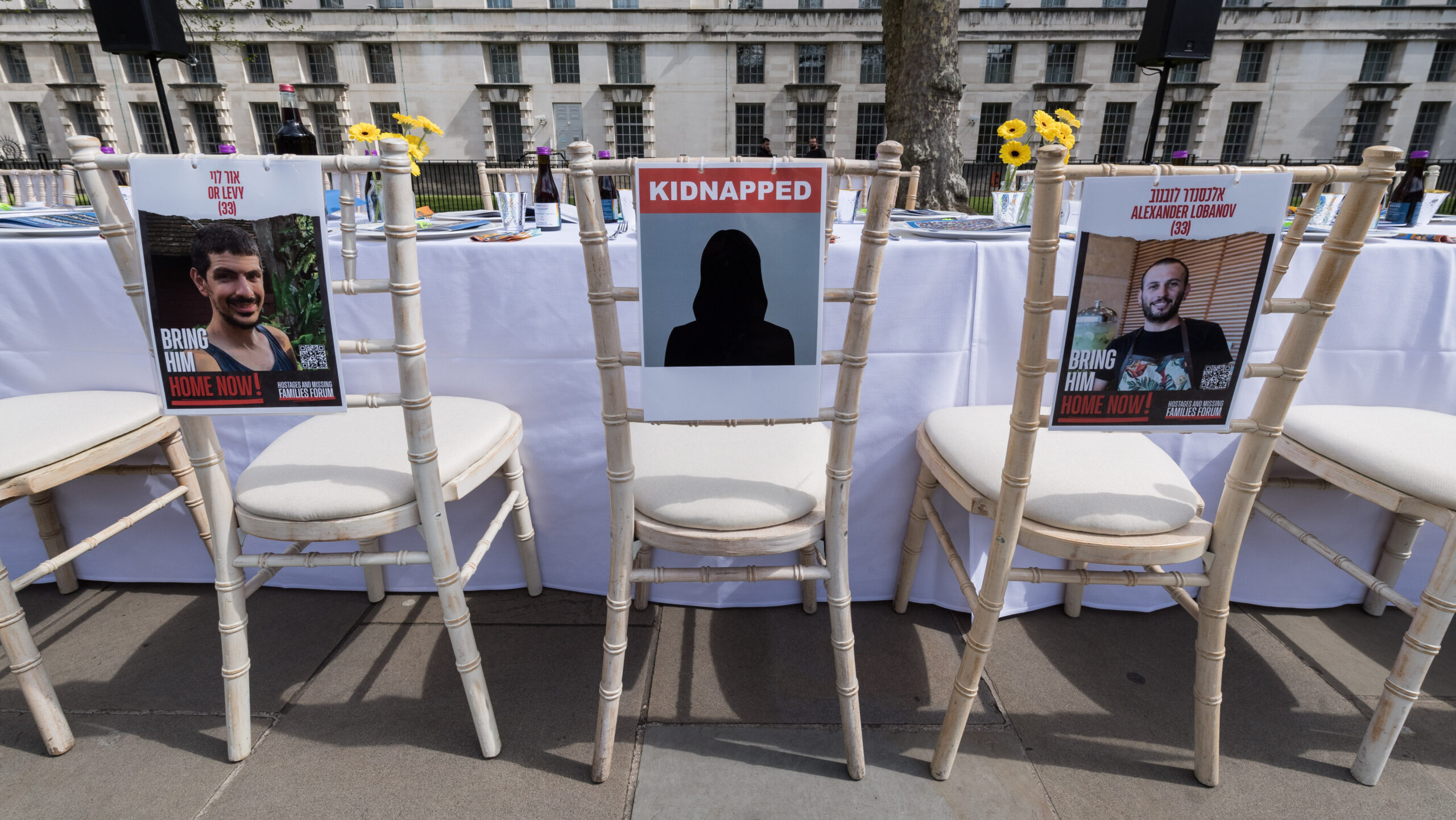Can We Still Celebrate Freedom This Passover?
With Passover approaching, Jews mourn as 59 hostages remain in Gaza since October 7. The holiday's theme of freedom rings hollow amid fresh trauma, as voices call for justice and the end of captivity.
Passover is the Jewish festival of freedom—a holiday centered on redemption, liberation, and retelling the Exodus from Egypt. But as the holiday approaches for the second year since the October 7 massacre, a painful question lingers: Can Jews truly celebrate freedom when 59 of their brothers and sisters are still being held hostage in Gaza?
More than 18 months after the attack, which saw more than 250 people kidnapped from Israel and dragged into Gaza, the trauma remains fresh. For many, this year’s Seder, the holiday meal, will not feel like a reenactment of ancient suffering but a reflection of present-day reality.
There have always been challenges facing the Jewish people—from rising antisemitism to war and poverty. Jews still live in conflict zones like Russia and Ukraine, and in Israel alone, 1.95 million people live below the poverty line, including 853,900 children, or 28% of the population, according to the National Insurance Institute.
But the image of Jews held captive during Passover—for a second consecutive year—is unprecedented in modern history. And it’s casting a long shadow over the festival of freedom.
“This Passover, our celebration of freedom rings hollow as our hearts remain trapped in Gaza,” said Eylon Levy, a British-American influencer and president of the Israeli Citizen Spokespersons’ Office.
“The October 7 hostage crisis has committed the worldwide Jewish People to a tangible struggle for freedom,” Levy continued. “None of us are free till all of them are free.”
The Passover Seder is not just a story told; it is a story lived. Families gather around the table not only to recount the biblical Exodus but to fulfill a commandment from Exodus 13:8: “And on that day you shall tell your child, for this God has taken me out of the land of Egypt.”
American Israeli influencer and tech advisor Hillel Fuld said that most years, it’s hard to genuinely feel like the Jewish people are still enslaved.
Give the gift of hope
We practice what we preach:
accurate, fearless journalism. But we can't do it alone.
- On the ground in Gaza, Syria, Israel, Egypt, Pakistan, and more
- Our program trained more than 100 journalists
- Calling out fake news and reporting real facts
- On the ground in Gaza, Syria, Israel, Egypt, Pakistan, and more
- Our program trained more than 100 journalists
- Calling out fake news and reporting real facts
Join us.
Support The Media Line. Save democracy.


“But this year, in 2025, it’ll be a lot easier as 59 of our brothers and sisters remain in captivity,” Fuld said. “This year, it won’t take much to feel the pain of persecution and antisemitism.”
For generations, Jews have ended the Seder with a hopeful call: “Next year in Jerusalem.” But this year, Fuld said, that prayer will carry new meaning.
“This year, I know I’ll add something new to that prayer,” he said. “I’ll pray to return to Jerusalem with my 59 brothers and sisters and with my nation after we are cured and have rid the world of the evil that is our enemies.”
Fuld noted that Jewish history is filled with moments of joy born out of pain.
“We will win,” he said. “We will heal. We will celebrate. And we will dance again.”
Others are feeling the weight of captivity as they prepare for the holiday.
“We are about to sit at the Seder table, and there are still 59 hostages—some of them are kept in captivity even in their death—who are not with their loved ones, who are chained in the tunnels of Hamas only because they are Jewish,” said Hananya Naftali, Israeli YouTuber and digital aide to Israeli Prime Minister Benjamin Netanyahu. “Their absence turns our celebration into a mission.”
“For me, freedom this year means moral clarity: standing against terror, refusing to normalize this cruelty, and demanding the world do the same. Until they are home, our nation is not fully free,” he said.
Similarly, Pastor Trey Graham of First Melissa Church in Texas posed a powerful question: How does one celebrate the gift of freedom while simultaneously lamenting its absence? He pointed to the harsh reality that hostages are suffering, soldiers are fighting, and protesters are shouting.
“What truth could set us free this Passover?” Graham asked. “King David the psalmist offers us a glimpse of Passover hope in Psalm 34 when he reminds us that ‘the Lord is near to the brokenhearted and saves those who are crushed in spirit.’”
That sense of spiritual tension—between tradition and present-day tragedy—is felt across the Jewish and Christian worlds.
“This year, freedom feels like a fractured word,” added Israeli writer and activist, Hen Mazzig. “For 18 months, 59 souls have remained in the darkness of captivity, while the rest of us sit around the table with our families, tell ancient stories of liberation, and open our doors to imagined strangers. How can we open our doors when theirs remain locked?”
He added that for those still alive in captivity, life has been suspended.
“Passover asks us to remember the Exodus, but this year, I’m thinking less about crossing seas and more about crossing silences,” Mazzig said. “True freedom isn’t just escape from bondage; it’s the collective refusal to forget those still enslaved.”
Former hostage Omer Shem Tov told Mike Evans, founder of the Friends of Zion Heritage Center and Museum in Jerusalem, that faith in God kept him alive, Evans told The Media Line. In response, Evans said: “The Jewish people [on Passover] will remember how faith in God brought a great miracle of deliverance. May it be so for the remaining hostages in Gaza.”

